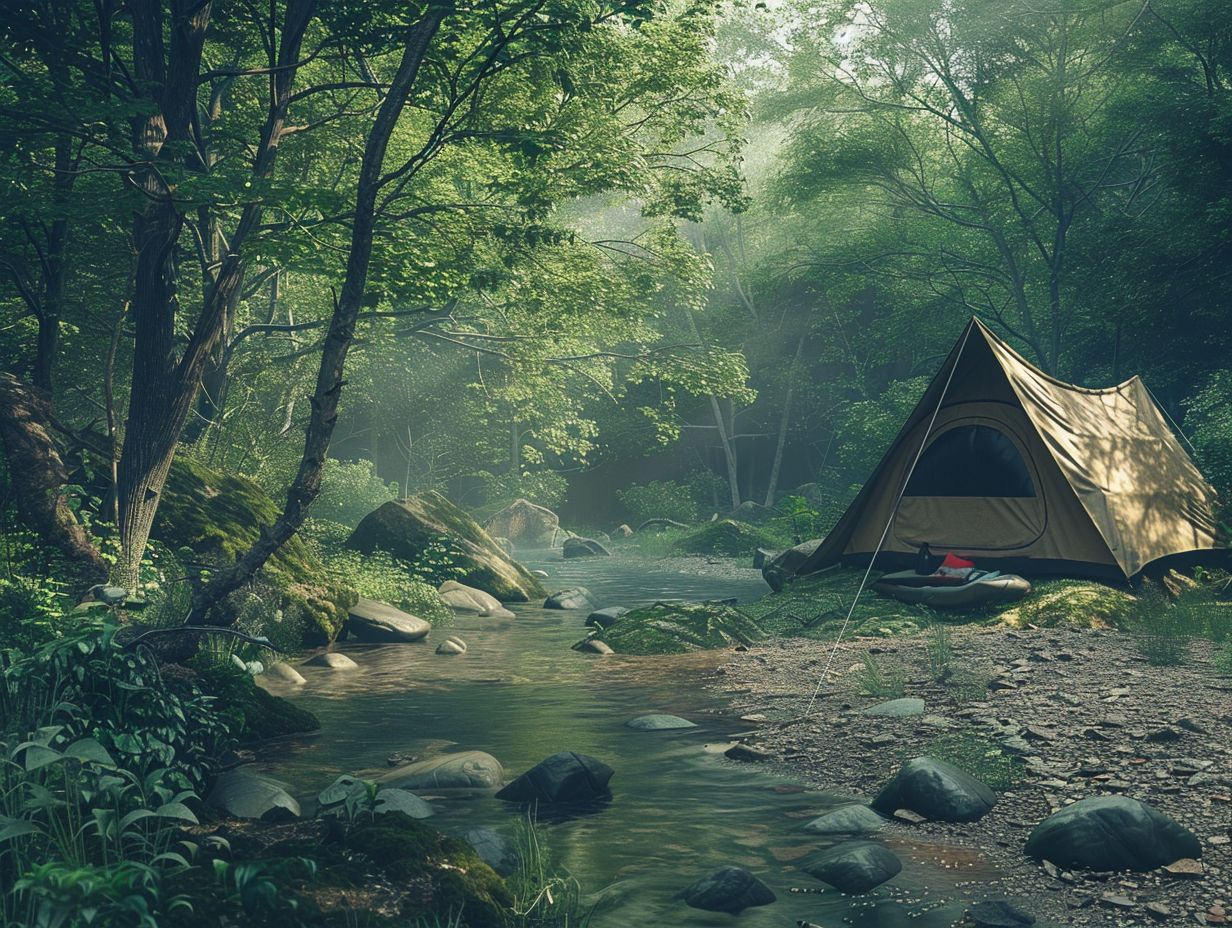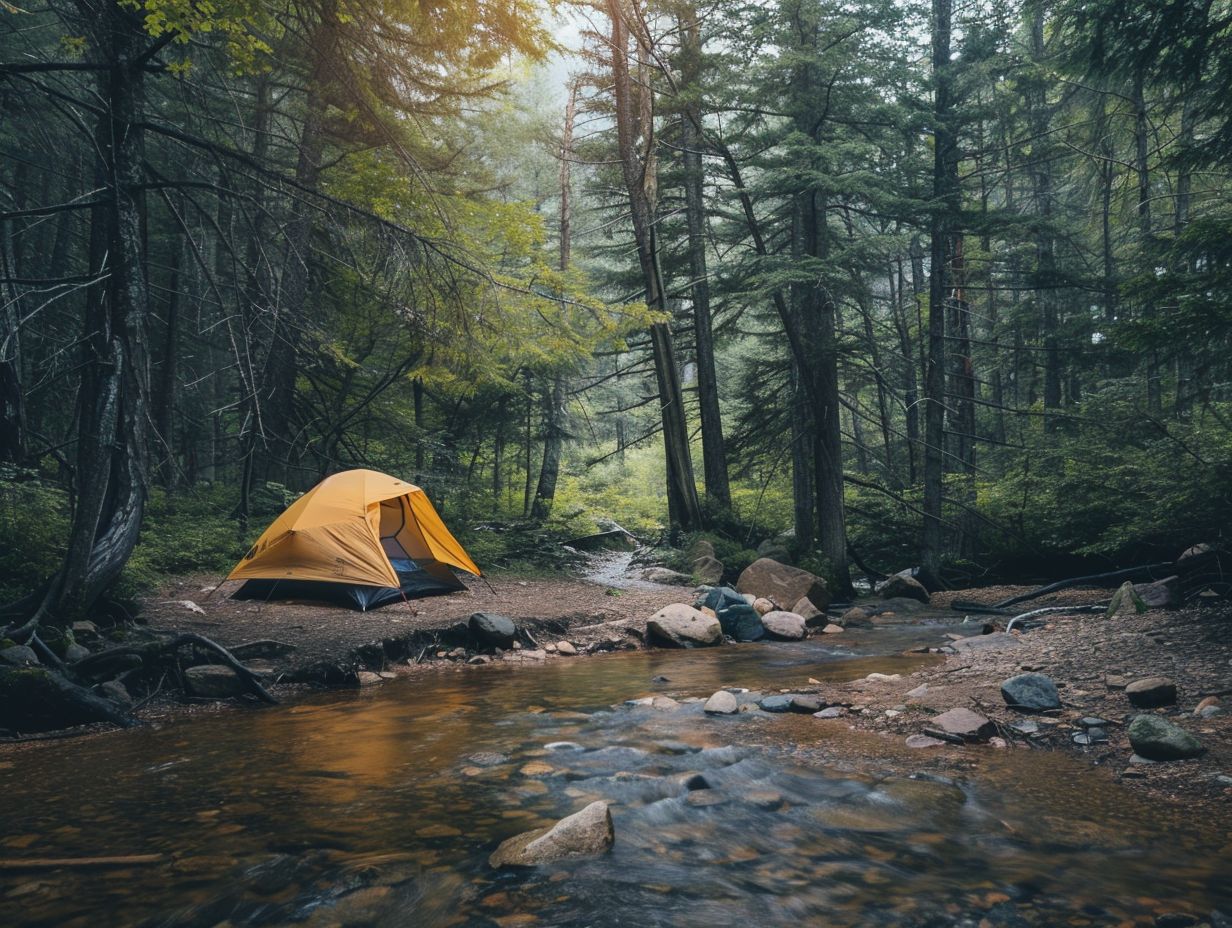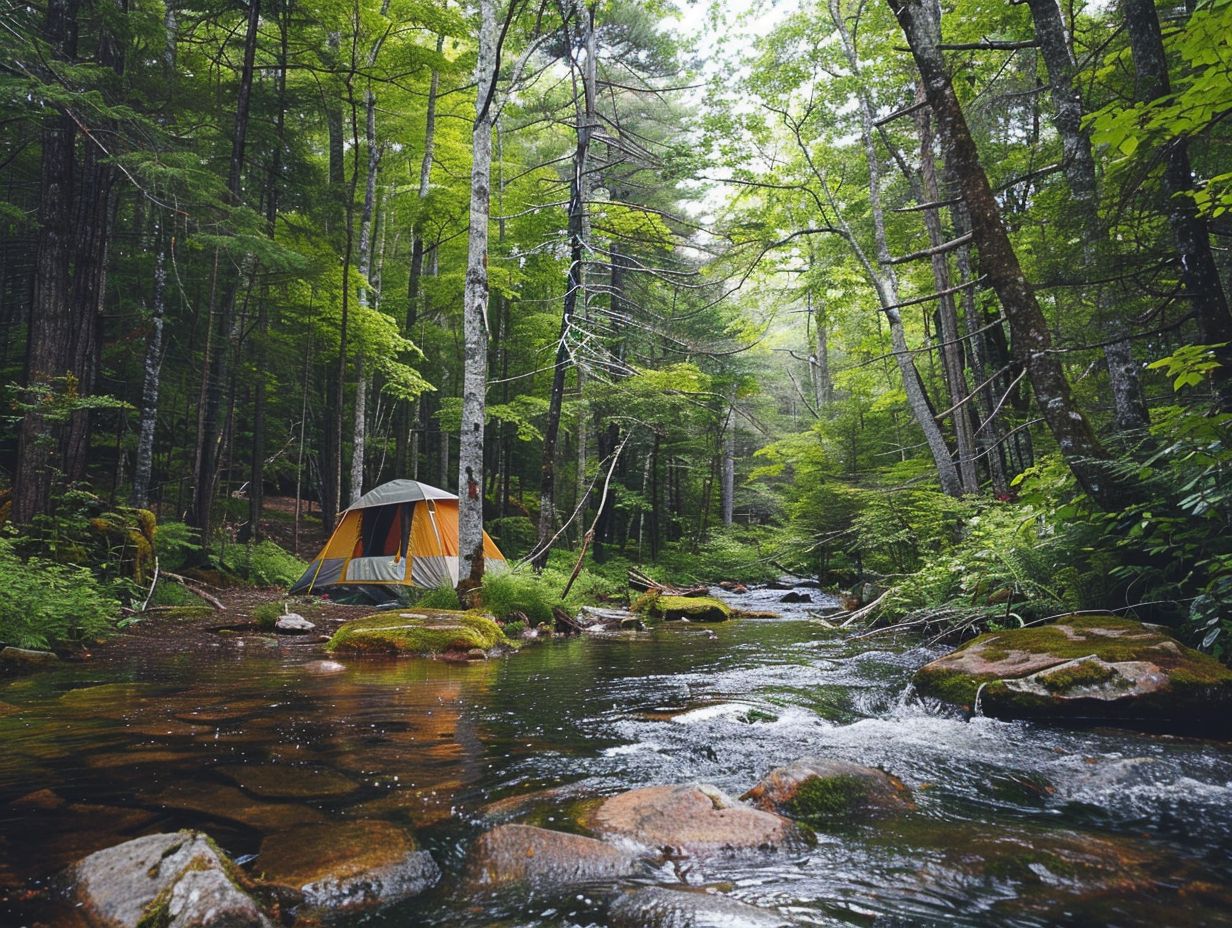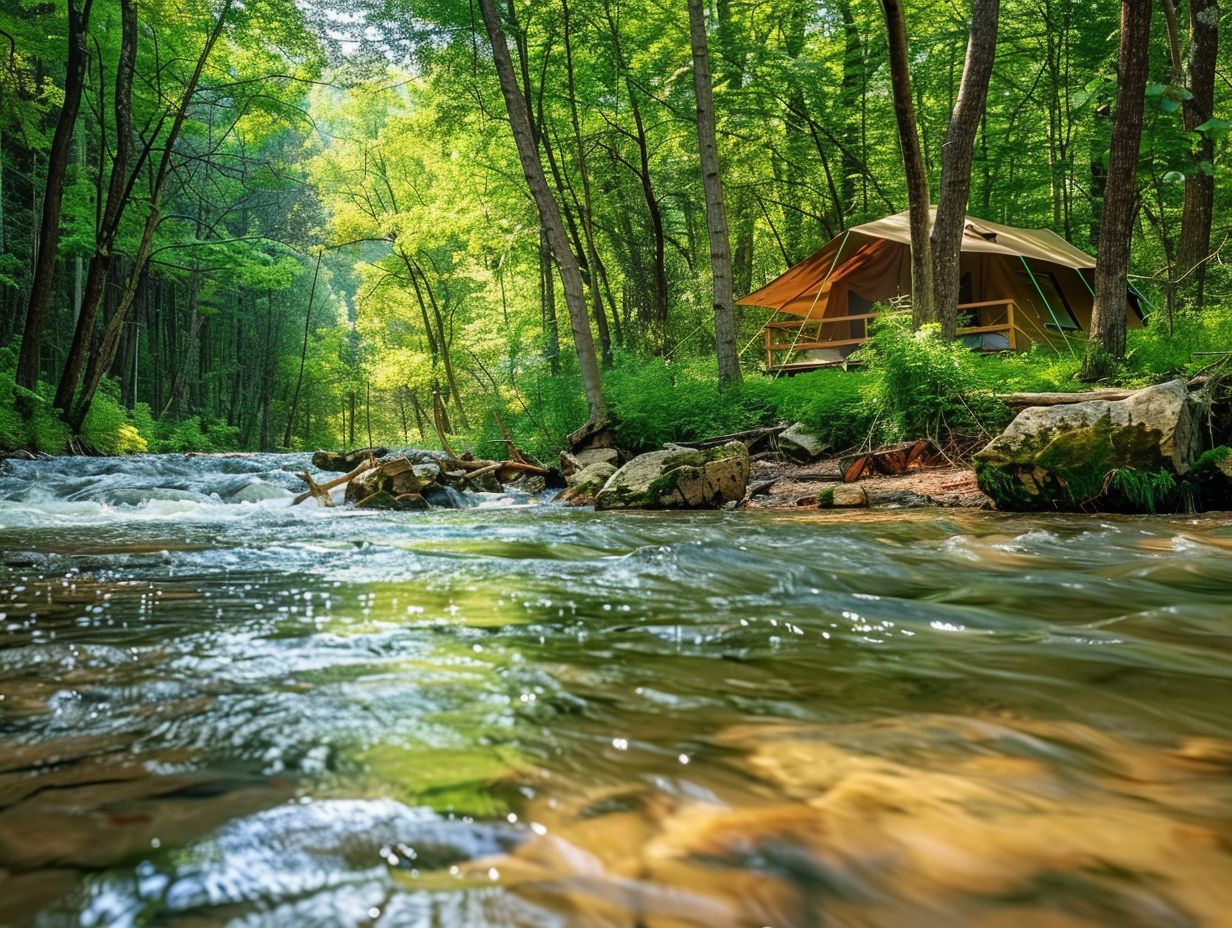If you are eager to explore the great outdoors and fully appreciate the beauty of national parks, it is essential to practice responsible camping. This guide will provide you with all the necessary information to optimise your camping experience while also making a positive contribution to the environment. Let us delve into the details and learn how to camp responsibly in national parks.
Key Takeaways:

- Plan your trip responsibly by researching the park and obtaining necessary permits and packing accordingly.
- Choose a campsite carefully, keeping in mind its location and impact on the environment.
- Leave no trace by following Leave No Trace principles, respecting wildlife and park rules, and properly disposing of waste.
Planning Your Trip
Before setting off on your camping adventure in a national park, it is essential to engage in thorough planning to ensure a smooth and enjoyable trip. Key steps in preparation include researching campsites, making advance bookings, and outlining your schedule for visiting the park.
Researching the Park and Obtaining Permits
When planning your visit to a national park, it is crucial to conduct thorough research to gather valuable information on amenities, attractions, and specific regulations.
Websites such as nps.gov offer comprehensive insights into renowned parks like Yellowstone and Yosemite, enabling you to make well-informed decisions prior to your journey.
By diving into the park websites, you, as a visitor, can unearth a plethora of essential details regarding amenities like camping grounds, hiking trails, visitor centres, and recreational facilities.
Familiarising yourself with the regulations concerning activities such as wildlife viewing, fishing, and camping permits provides travellers with the necessary knowledge to ensure a seamless and enjoyable park experience.
Each national park boasts its own distinctive attractions, ranging from geysers in Yellowstone to towering cliffs in Yosemite. Therefore, conducting research in advance is imperative for tailoring your visit to align with your preferences and interests.
Packing and Preparing for Your Stay
Ensuring comfort, safety, and adherence to park regulations during your camping stay in a national park involves packing essential items and preparing adequately.
Items such as campfire essentials, proper food storage containers, and personal hygiene products like biodegradable bathroom supplies are crucial for a smooth outdoor experience.
Before you head out, it is advisable to invest in a durable cooler to maintain the freshness and security of your food. Packing non-perishable snacks and easily cooked meals can provide convenience during your stay.
When constructing a campfire, it is important to adhere to park guidelines by choosing a safe location away from overhanging branches and having a bucket of water nearby for emergencies.
Additionally, bringing a portable camping stove for backup cooking options and storing all food in airtight containers can help prevent wildlife attraction.
Always carry a compact shovel and biodegradable toilet paper to responsibly manage waste during your nature excursions.
Why it Matters?
Understanding the importance of camping responsibly in national parks is crucial for preserving the natural beauty and wildlife whilst ensuring the safety of visitors.
Adhering to park regulations, respecting wildlife habitats, and paying applicable fees contribute to the sustainability and conservation efforts of these protected areas.
By following safety protocols such as properly storing food to prevent wildlife interactions and choosing designated campgrounds, you can minimise your impact on the delicate ecosystem.
Responsible camping practices not only help protect endangered species and sensitive environments but also enhance the overall experience for all park visitors.
Understanding and obeying park rules regarding campfires and waste disposal are essential in preventing wildfires and maintaining the cleanliness of these pristine landscapes.
Choosing a Campsite

When selecting the ideal campsite within a national park, you should take into account factors such as availability, campsite rules, and the guidance of campsite hosts.
Whether you choose first-come, first-served pitches or designated locations like Chisos Basin Campground, familiarizing yourself with campsite regulations and engaging with hosts can enhance your camping experience.
Considerations for Location and Impact
When selecting a campsite location within a national park, it is crucial for you to evaluate the fire danger level and understand fire safety protocols to minimise risks and protect the natural environment.
By being mindful of potential fire hazards and adhering to campground-specific guidelines, you can effectively reduce the likelihood of fire-related incidents during your stay.
A fundamental aspect of assessing fire danger involves inspecting the surrounding vegetation and terrain for indications of dryness or flammability. It is essential to take into account weather conditions, such as high winds or drought, as they can significantly enhance the chances of a fire spreading.
Implementing fire safety practices like creating a clear zone around your campsite, carrying a fire extinguisher, and consistently supervising a campfire can substantially lower the risk of accidental fires.
Compliance with campground regulations regarding fire usage, including utilising designated fire pits and observing permissible hours for campfires, not only promotes responsible camping but also helps prevent wildfire outbreaks.
Minimising Your Environmental Impact
When camping in national parks, it is crucial to minimise your environmental impact, as this aligns with the Leave No Trace principles. Respecting the natural surroundings, reducing waste, and adhering to responsible outdoor ethics are essential components in preserving the park’s ecosystems and ensuring a sustainable outdoor experience.
Leave No Trace Principles
Adhering to the Leave No Trace principles advocated by iconic figures like Smokey the Bear is essential for ensuring sustainable camping practices in national parks.
These principles emphasise responsible outdoor habits, waste reduction, and ecosystem preservation to maintain the natural integrity of protected areas.
By following these guidelines, you can minimise your impact on the environment by leaving campsites as you found them, refraining from littering, and respecting wildlife habitats. The principles also stress the importance of practising proper fire safety and being mindful of noise levels to preserve the peace and tranquillity of natural surroundings.
Promoting a deeper understanding of these principles can help instil a sense of environmental stewardship in individuals, fostering a more sustainable approach to outdoor recreation.
Respecting Wildlife and Park Rules
Adhering to park rules and showing respect for wildlife are crucial aspects of responsible camping in national parks. Prioritising safety measures, compliance with park regulations, and keeping a respectful distance from wildlife habitats all play key roles in fostering a harmonious relationship between visitors and the natural environment.
Safety Tips and Regulations

Prioritising safety tips and adhering to park regulations whilst camping in national parks ensures a secure and enjoyable outdoor experience for you. Whilst modern amenities like Wi-Fi may not always be available, being well-informed about safety measures, emergency protocols, and communication strategies is key to ensuring a successful camping trip.
It is crucial for you to familiarise yourself with the specific rules and guidelines of the national park you are visiting, as each park may have unique safety considerations.
Always inform a trusted individual about your exact camping location and expected return time as part of your communication strategy. Packing essential safety items such as a first aid kit, torch, and emergency contacts list can significantly enhance your preparedness in case of unforeseen situations whilst camping.
Proper Waste Disposal
Implementing proper waste disposal practices is crucial for maintaining cleanliness and ecosystem health within campsites of national parks. Utilising effective food storage methods, using designated toilet facilities, and adhering to waste management guidelines are necessary steps in preserving the natural beauty of these outdoor spaces.
How to Leave Your Campsite Clean
Ensuring a clean campsite before setting off is vital for reducing environmental impact and fire risk within national parks. Properly extinguishing campfires, collecting and disposing of rubbish, and leaving no trace of your presence are essential steps in maintaining the pristine condition of campsites.
When you extinguish a campfire, it is important to allow it to burn down to ash, then pour water over the embers and stir them. Ensure the ashes are cool to the touch before you leave. All rubbish should be taken away in sealed bags to prevent wildlife interference.
Carry a rubbish bag with you and pick up any litter, including small items like bottle tops or food packaging. Spread out any disturbed soil or vegetation, and return any moved rocks to their original positions to minimise impact on the ecosystem.
Leaving a Positive Impact
To leave a positive impact on national parks, you should support preservation efforts and take advantage of resources like the America the Beautiful Pass for improved park visits.
By engaging in responsible camping, participating in conservation initiatives, and purchasing park access passes, visitors can play an active role in promoting the sustainability and safeguarding of these natural wonders.
Ways to Give Back and Support National Parks
There are several ways you can contribute to the preservation and support of national parks. These include volunteering for park maintenance and donating towards conservation efforts. When you responsibly use park amenities and pay designated fees for services, you play a crucial role in maintaining and improving park facilities for future park-goers.
Volunteering for park maintenance not only assists in preserving the natural environment but also provides you with the opportunity to forge a deeper connection with nature. Donating towards conservation efforts ensures the safeguarding of wildlife and ecosystems within the parks.
Responsible utilisation of park amenities, such as adhering to designated trails and proper waste disposal, helps minimise adverse effects on the environment. By paying fees for park services, you contribute to funding vital projects like trail maintenance and visitor programmes, which benefit both the parks and their visitors.
Frequently Asked Questions

What can I do to minimise my impact while camping in national parks?
To camp responsibly in national parks, you can follow the principles of Leave No Trace. This includes properly disposing of waste, respecting wildlife and vegetation, and leaving natural objects and artifacts untouched. Additionally, you can use designated campsites and trails, and avoid making campfires unless they are permitted and safe to do so.
Do I need a permit to camp in national parks?
It depends on the specific park and type of camping you plan to do. Some parks require permits for backcountry camping, while others may require permits for all types of camping. It’s important to research and obtain any necessary permits before your trip to ensure that you are following all park regulations.
How should I handle food and waste while camping in national parks?
Properly storing and disposing of food and waste is crucial when camping in national parks. This helps to prevent attracting wildlife and damaging the environment. Follow the guidelines set by the park, such as using bear-proof containers or hanging food in designated areas, and always pack out any trash or waste.
Can I bring my dog when camping in national parks?
Some national parks allow dogs in designated camping areas and trails, while others have strict rules against it. If you plan on bringing your dog, make sure to research the specific park’s rules and always keep your pet on a leash and clean up after them.
What should I do if I encounter wildlife while camping in national parks?
If you encounter wildlife while camping in national parks, it’s important to remember to keep a safe distance and never approach or feed them. Keep your food and trash properly stored to avoid attracting animals. If you feel unsafe, slowly back away and report the encounter to park staff.
How can I help preserve national parks for future generations?
Camping responsibly in national parks is not just about minimising your impact during your trip, but also helping to preserve these natural spaces for future generations. You can do this by properly disposing of waste, staying on designated trails, and respecting the rules and regulations set by the park. Additionally, consider volunteering or donating to organisations that help protect and maintain national parks.



